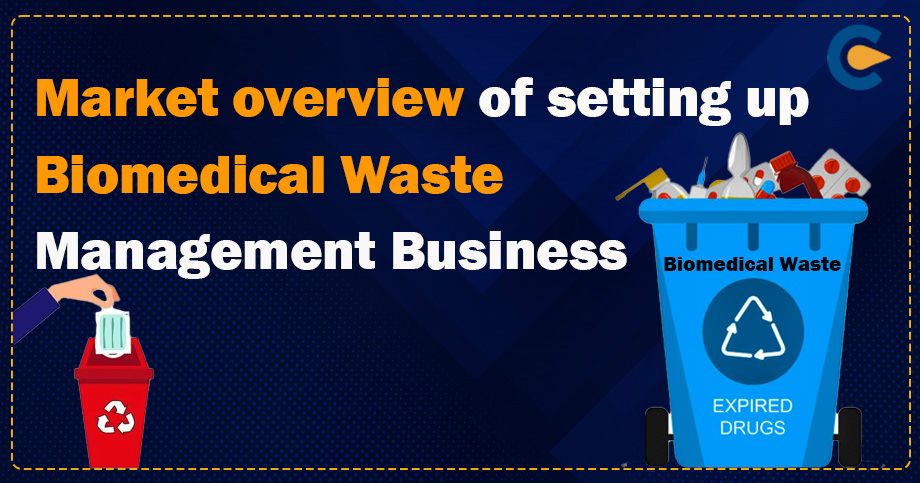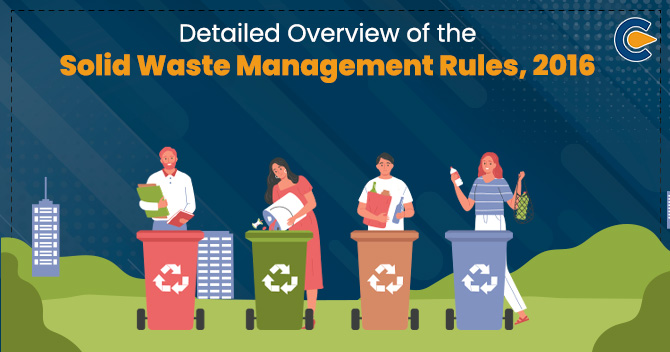Biomedical waste management is emerging as an important and crucial area of waste management with the rise in hospital and other health care facility waste, especially after Covid-19, where the Bio-medical waste has increased to an uncontrollable level. These types of waste are generated through various medical procedures, including surgeries, treatments, diagnoses etc. India in 2021-2022 has produced about 775.5 tonnes of medical waste per day, which is a considerable jump from the previous level of 550.9 tonnes daily.
With so much increase in Bio-medical waste, the regulatory pressure on the central authorities and MOEF and CC (the Ministry of Environment, Forest and Climate Change) have also increased to manage this waste in an environmentally sustainable way.
The process that is followed by Biomedical Waste Management Business comprises environmentally safe transportation, treatment or disposal, destruction and report of waste generated during the process of Biomedical Waste management.
Market overview of setting up Biomedical Waste Management Business
With the rise in overall awareness among people relating to waste management and initiatives by authorities to decrease pollution by implementing new Biomedical waste management rules, there is a constant rise in the market for Biomedical Waste Management Business. According to a report published, India in 2021-2022 has produced about 775.5 tonnes of medical waste per day, which is a considerable jump from the previous level of 550.9 tonnes daily.
Further, it is estimated that Global Medical Waste Management Market will reach 26.9 Bil Dollars by 2025, with CAGR (Compound annual growth rate) of 5.6% from 2017-2025. In contrast, the Biomedical waste management business market in India is expected to reach $ 39 million by 2024.
Medical Waste
Medical Waste is defined under different categories under the Central Pollution Control Board Implementation guidelines of Biomedical Waste Management Rules-2016[1]. These categories are: –
- Biomedical Waste
- General Waste
- Other Wastes
Biomedical Waste
Biomedical Waste consists of 15 per cent of total Health Care Waste that is generated during treatment, diagnosis or immunisation of animals or research activities related to testing, production of biological or in health camps.
This waste includes all waste which can have a detrimental effect on human health or the environment if not handled properly and generated from the health care facilities managed under Biomedical Waste Management Rules, 2016. This waste includes the components which have been in contact with the secretions, medicines, patient’s blood, lab discharge, sharps, biological liquids such as chemicals, infected parts, medical supplies, metallic and glassware, plastics etc.
Biomedical Waste Management Rules, 2016, classified Bio-medical waste into four categories that are generated from the health care facility and restricted based on pathways and colour code. These categorisations are: –
- Yellow Category
- Red Category
- White Category
- Blue Category
| Yellow Category | Human Anatomical waste Animal Anatomical Waste Soiled Waste Discarded or Expired Medicine Chemical Waste Chemical Liquid Waste Discarded Linen, Mattresses, bedding that are infected with body fluid or blood, routine mask or gown. Biotechnology, Microbiology and other clinical laboratory waste (Pre-treated) |
| Red Category | Waste generated from disposed of items like tubing, bottles, catheters, syringes without needles, intravenous tubes and sets, fixed needle syringes with their needle cut, gloves and vacutainers |
| White Category | Sharp Waste includes Needles, syringes with fixed needles, needles from needle tip cutters or burners, scalpels, blades, or any other contaminated sharp object that may cause punctures and cuts. This includes both expended, thrown away and infected metal sharps |
| Blue Category | Broken or discarded and contaminated glass, including medicine vials and ampoules except those contaminated with cytotoxic wastes |
Establishing a Biomedical Waste Management Business
Before establishing a Biomedical Waste Management Business, one has to comply with the conditions mandated under the guidelines provided by the Ministry of Environment, Forest and Climate Change. According to the Bio-Waste Management Rules, 2016 for acquiring Bio-Waste Management Authorisation, Health care facilities should not establish setup outside the premises of Biomedical Waste treatment facilities in case a Common Biomedical Waste Treatment and Disposal Facility is established within 75 km of distance.
Procedure for establishment of biomedical waste management business
To establish a biomedical waste management business, one has to get a consent Certificate from the appropriate Pollution Control Committee of Union Territory/State Pollution Control Board. Along with the application of this authorisation, there are required documents that need to be submitted.
Documents that are required for registration of Biomedical Waste Management Business
- Application as per Form-II prescribed under Biomedical Waste Management Rules, 2016
- Letter of Requisition
- Treatment, storage and disposal facility agreement copy with the stakeholders
- Site Plan/Layout plan of the facility
- Affidavit Self Declaration for Ownership
- Affidavit/Self Declaration for Liquid Waste Treatment
- Copy of Consent to Establish (CTE) mandated under the Air and Water (Prevention and Control of Pollution) Act
- Copy of consent to operate(CTO) mandated under the Air and Water (Prevention and Control of Pollution) Act
- Map with GPS locations of Common Biomedical Waste Treatment and area of coverage.
- Contingency plan of Common Biomedical Waste Treatment.
- Copy of the manifests of transport of waste
General Waste
Any waste which has not been in contact with any hazardous or contaminated or any chemical or biological discharge or any waste other than Bio-medical waste and does not include any sharp object or waste. The waste consists of: –
- Dry Waste
- Newspaper, paper and card boxes
- Plastic water bottles
- Aluminium cans of soft drinks
- Packaging materials
- Food Containers after emptying residual food
- Wet Waste
- Organic / Bio-degradable waste – mostly food waste
- Construction and Demolition Waste
Establishing a Solid Waste Management Business
This waste mostly comes under Solid Waste for establishing a Solid waste management business; one has to get consent from NOC and appropriate authorisation from Pollution Control Committee/State Pollution Control Board. With this authorisation, there are mandated documents that need to be submitted.
Documents Required for Solid Waste Management Authorisation
- Copy of Land Allotment documents like land agreement/rent agreement/lease documents.
- Copy of Environmental Clearance for Common Municipal Solid Waste
- Copy of Consent to Establish (CTE) mandated under the Air and Water (Prevention and Control of Pollution) Act
- Copy of consent to operate(CTO) mandated under the Air and Water (Prevention and Control of Pollution) Act
- Copy of Agreement between critical stakeholders (Municipal Authority and operating agency).
- Details of financial breakup and annual return.
- Project Report of Solid Waste Management.
- Authorisation of District Site Selection Committee
- Municipal Solid Waste Annual Report of the previous year.
- Authorisation is issued to the operator of the solid waste processing facility (in case a private operator is operating the site).
Establishment of Plastic Waste Management Business
This waste also contains Plastic Waste which is sent to Plastic Waste recyclers for further recycling. For establishing a plastic recycling facility, the Recyclers need to get authorised by Pollution Control Committee for Union Territory/ State Pollution Control Board of the concerned state, prescribed as per Rule 13 of the Plastic Waste Management Rules, 2016, for which they have to follow the following steps:-
- First, the applicant has to create their unique Industry Registration ID with Pollution Control Committee for Union Territory/ State Pollution Control Board through their online portal.
- After the creation of the Registration ID, the applicant of the management plant will apply for registration as per the given categories along with the required document.
- Following this, the recyclers should select Form II after logging in.
License/ Documents required to set up the business
- Electricity Bill
- Authorized signatory Aadhar Card
- Layout Plan
- FSSAI Certificate
- NOC by state pollution control board
- GST registration
- Authorized signatory PAN Card
- MSME Registration
Establishment of Construction and Demolition Waste Management Business
Under general waste, the Construction and demolition waste is also included, which is included under the solid waste management Rules. For setting up a C&DW (Construction and demolition waste) recycling facility, the Recyclers need to get authorised by the Pollution Control Committee for Union Territory/ State Pollution Control Board of the concerned state by applying through Form 1, which is followed by site inspection and review of documents. Once the PCC/SPCB is satisfied, only then is the applicant granted authorisation.
Documents required for Construction Waste Recycling Business
- PAN Card of the Authorized Signatory
- GST Certificate
- Layout plan
- Process flow chart
- Details of the machinery installed
- Proof of ownership of site or rent/lease agreement
- Factory license/trade license
Other Waste
Other wastes from health care facilities which are included in Medical Waste is WEEE (Waste Electronic and Electrical Equipment), Used Batteries and Radio-Active Waste, which have to be handled or managed as per E-Waste (Management) Rules, 2016, Batteries (Management & Handling) Rules, 2001, and Rules/guidelines under Atomic Energy Act, 1962 respectively.
Establishment of E-Waste Management Business
Licenses for the establishment of E-Waste Management Business are acquired through the Pollution Control Committee for Union Territory/ State Pollution Control Board, which follows the similar procedure of filling out the application, followed by scrutiny of the said application or inspection and at last grant of said certificate. The application for authorisation requires some mandated documents.
Documents required for E-Waste Management Business
The documents given below are required to be submitted along with the Application.
- EPR plan;
- Financial breakup for EPR;
- Self-declaration for compliance with RoHS;
- Copy of registration issued by the SPCBs/PCCs earlier under E-Waste (Management & Handling) Rules, 2011 in case of those recyclers/manufacturers who are working in the India prior to 01-10-2016;
- Details of proposed awareness programmes and allied initiatives;
- Copy of the permissions/licences from the relevant ministry/department for marketing various products or for doing the business as given below:
- TIN details;
- PAN details;
- Incorporation certificate;
- Copy IEC in case of importers;
- Copies of agreement document with Stakeholders (dealers, collection centres, dismantlers, recyclers, treatment, storage and disposal facilities (TSDFs) etc.)
Conclusion
Biomedical Waste Management, due to less competition in the market, provide businesses to grow expeditiously, which not only will prove lucrative to the business owners but also will provide the government with much-needed infrastructure to tackle the issue of growing Biomedical waste in much more environmentally sustainable way.
Read our Article:Categories of Bio-Medical Waste – An Overview











